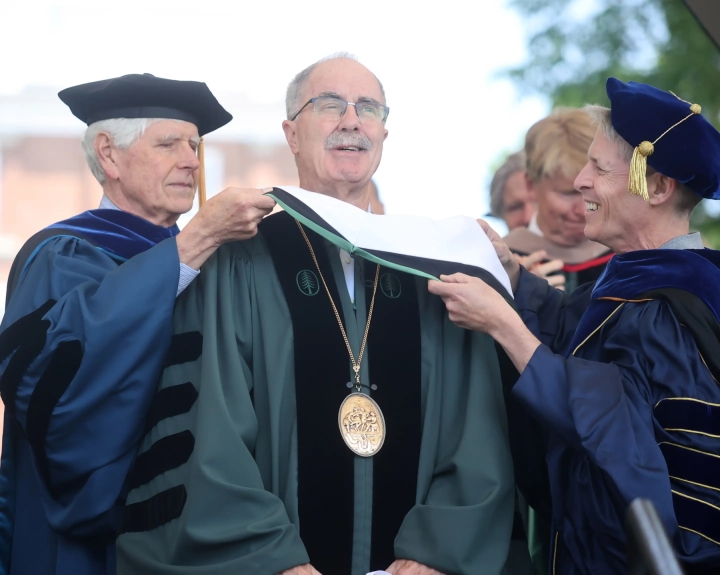PHILIP J. HANLON, as an outstanding teacher-scholar and visionary and pragmatic leader in higher education, you’ve guided Dartmouth through the most significant decade of institutional advancement in its 254-year history.
You arrived at Dartmouth as a student in 1973 from your small hometown of Gouverneur, New York, graduating Phi Beta Kappa with a degree in mathematics in 1977 before earning your Ph.D. from CalTech in 1981. Forty years later, following a series of successive appointments at the University of Michigan, you returned as Dartmouth’s 18th President to lead your alma mater.
Reflecting on our first 250 years, you charted a bold new course for the next: moving Dartmouth forward through academic excellence in service to the world. One by one, new buildings arose and new initiatives were born in support of that vision, fueled by a record-setting $3.7 billion raised through the Call to Lead, the most successful and inclusive fundraising campaign in institutional history.
You eliminated barriers to entry for the world’s most talented students through historic levels of funding for financial aid, while recruiting best-in-class faculty to Dartmouth through the academic clusters. At the same time, you energized our research enterprise – in part, through the establishment of the Frank J. Guarini School for Graduate and Advanced Studies along with world-class centers and institutes focused on some of the foremost challenges of our time. As a result of those efforts, Dartmouth not only regained its status as an R1 research university, but earned a seat at the table in the prestigious Association of American Universities.
What’s more, your unwavering commitment to building a more diverse, equitable and inclusive campus and to instilling a culture of prioritization and reallocation further elevated the success of the institution. And you never lost sight of the most important work of the College – teaching – dedicating yourself fully to students in the role of caring professor every year of your tenure.
Through it all, your calm, compassionate leadership and humility prevailed.
Your presidency will long be remembered as one of the most consequential in our history, both for the scope of its ambition and for the depth of its impact. It is, therefore, our pleasure to award you the Honorary Degree of Doctor of Humane Letters.

